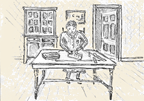

Featured Author

 |
|  |
| Home | Index | Museums | Blog | Authors | Site Map | About |
|
Orsamus TurnerThe following is taken from two articles by Robert G. Koch in the Winter 2001 issue of the Crooked Lake Review; the first about the lives and friendship of Henry O'Reilly and Orsamus Turner and the second about the etmology of Turner's first name. Orsamus Turner was born in Honeoye in 1801. Fatherless at eight, Turner knew the hardships of frontier life, including threats during the war of 1812. At 17 he was an apprentice printer in Palmyra. His mother died the next year. "Fortunately," according to a Rochester Historical Society article, "he secured an opportunity to complete his apprenticeship in the office of the ONTARIO COUNTY REPOSITORY at Canandaigua… [and was] well fitted… for the struggles ahead." At 21 he acquired his own paper, the LOCKPORT OBSERVATORY and in 1827 combined it with the NIAGARA SENTINEL. Meanwhile, he was active politically and joined the Masons. Although he was jailed and fined for suspected complicity in the disappearance of William Morgan, the anti-Masonic agitations did not slow his progress. He married and a decade later, in 1837, came to Rochester to advocate canal improvements. He met Henry O'Reilly and their friendship blossomed, so when O'Reilly projected a history of Western New York, Turner volunteered or was invited to collect "recollections of pioneer settlers still living in his neighborhood." But with the pressure of maintaining his newspaper to support a growing family, he did not accomplish much. In 1842 a soured real estate investment forced him to find other paid work. O'Reilly aided his appointment as collector of canal tolls at Lockport. Turner resumed his local history research and became interested in Joseph Ellicott, the pioneer manager of the Holland Purchase tract that spread from the Genesee to Lake Erie and the Niagara. When he asked O'Reilly's clearance to write on Ellicott, he received a somewhat discouraging reply, but O'Reilly was soon swept into other projects. By this time Turner was interested in more than Ellicott. He projected a history of Western New York and eventually got clearance and an unspecified amount of primary research from O'Reilly. Turner's 666-page PIONEER HISTORY OF THE HOLLAND PURCHASE OF WESTERN NEW YORK went into a second edition in 1850, by which time he added a 600-page PIONEER HISTORY OF PHELPS & GORHAM'S PURCHASE, covering the area between Seneca Lake and the Genesee. Between them, O'Reilly and Turner had written about 1700 valuable pages on the beginnings of Rochester and Western New York. Orsamus Turner, Pleaseby Robert G. KochTime to confess an innocent (well, perhaps, careless) deception that I've foisted on readers to these historical vignettes. Off and on since 1988, I've cited two bedrock books of our history: PIONEER HISTORY OF THE HOLLAND PURCHASE OF WESTERN NEW YORK: Embracing Some Account of the Ancient Remains; A Brief History of Our Immediate Predecessors, the Confederated Iroquois… A Synopsis of Colonial History… the Border Wars of the Revolution…and a History of Pioneer Settlement; Reminiscences of the War of 1812, the Origin, Progress and Completion of the Erie Canal, etc., etc., etc. (Actually, I've somewhat shortened the title.) And the second classic: HISTORY OF THE PIONEER SETTLEMENT OF PHELPS AND GORHAM'S PURCHASE, AND MORRIS' RESERVE (and again, much more, including histories of ten counties in whole or part). The two books were published in Buffalo, 1850, and Rochester, 1851, respectively, by "O. Turner." I've gratefully acknowledged the authorship of "Orasmus" Turner, only to discover recently, from, Jim Brunner, the Geneseo book dealer who republished the HOLLAND PURCHASE book in 1974, that "O. Turner"-and he never signed himself otherwise in these volumes- was not "Orasmus" but "Orsamus" Turner. Checking bibliographies, from which I must have first acquired the name, I found that I had mistakenly inverted the sa as as. However, checking my dictionaries of given names I found no Orsamus, or Orasmus, for that matter, which I probably also shaped to my memory's ear for Erasmus, as in Erasmus Darwin, for example. That left me wondering about the origins of Orsamus. Here's the kicker: my reconstruction of its root meaning took me from Old English back thru the Germanic suffix "ors," which can be traced back to ancient Greek, and means, quite simply, "buttocks" or "backside." But what about the "mus"? Well, again, it's pretty plain: from Old English, to Germanic, to Latin and Greek, and even to Sanskrit, it has continued to mean "mouse" and, of course, that mouse under the skin, "muscle." So, Orsamus Turner? Well, was it "mouse buttocks" or "muscular backside." In either case, it seems clear to me why Turner rendered it simply as "O." Thought you ought to know. CLR Blog | Site Map | Contact CLR |